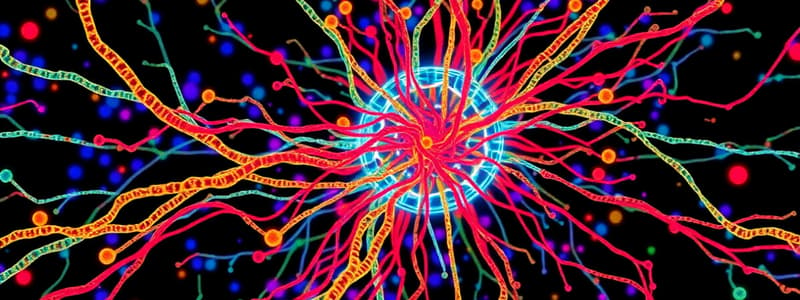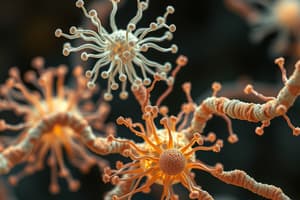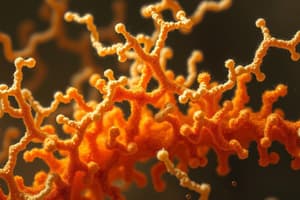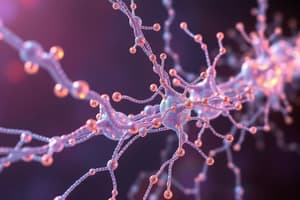Podcast
Questions and Answers
What structure serves as the main nucleation site for microtubules?
What structure serves as the main nucleation site for microtubules?
- Mitochondria
- Nucleus
- Ribosome
- Centrosome (correct)
Microtubules can grow preferentially at their minus end.
Microtubules can grow preferentially at their minus end.
False (B)
What regulates microtubule stability through GTP-hydrolysis?
What regulates microtubule stability through GTP-hydrolysis?
GTP-cap
Microtubules are composed of _________ proteins.
Microtubules are composed of _________ proteins.
Match the microtubule-associated proteins with their functions:
Match the microtubule-associated proteins with their functions:
Which statement about microtubule dynamics is accurate?
Which statement about microtubule dynamics is accurate?
Dynamic instability is a characteristic of microtubules.
Dynamic instability is a characteristic of microtubules.
What are the subunits that make up microtubules?
What are the subunits that make up microtubules?
The _________ end of a microtubule is where most growth occurs.
The _________ end of a microtubule is where most growth occurs.
Which of the following microtubule-associated proteins is responsible for severing microtubules?
Which of the following microtubule-associated proteins is responsible for severing microtubules?
Flashcards
Microtubule Structure
Microtubule Structure
Microtubules are protein filaments found in various locations in cells, forming singlets, doublets, or triplets depending on spacing determined by associated proteins.
Microtubule Dynamics
Microtubule Dynamics
Microtubules constantly grow and shrink (dynamic instability) at their plus ends, a process controlled by GTP hydrolysis.
Microtubule Growth
Microtubule Growth
Microtubules grow from organizing centers (MTOCs) at their minus ends, where they are nucleated by gamma-tubulin ring complexes, elongating preferentially at the plus end.
GTP-Cap and Stability
GTP-Cap and Stability
Signup and view all the flashcards
Microtubule Motors
Microtubule Motors
Signup and view all the flashcards
Microtubule Associated Proteins (MAPs)
Microtubule Associated Proteins (MAPs)
Signup and view all the flashcards
Centrosome Structure
Centrosome Structure
Signup and view all the flashcards
Tubulin Polymerization
Tubulin Polymerization
Signup and view all the flashcards
Microtubule Plus End Binding Proteins
Microtubule Plus End Binding Proteins
Signup and view all the flashcards
Microtubule Severing
Microtubule Severing
Signup and view all the flashcards
Study Notes
Microtubule Structure and Function
- Microtubules are found in many locations and have similar structures.
- Microtubules are composed of protein dimers (alpha and beta tubulin).
- Microtubules exhibit dynamic instability; that is, they grow and shrink in a cyclical manner.
- Microtubules grow preferentially at their plus ends.
- The plus end of microtubules is where new tubulin dimers are added.
- The minus end of microtubules is where tubulin dimers are lost.
- GTP-hydrolysis controls microtubule stability.
- Nucleation occurs at the minus end of microtubules by gamma tubulin ring complexes.
- Microtubules grow from the microtubule-organizing center (MTOC).
- Microtubule spacing depends on the length of the projection domain of microtubule-associated proteins.
- Different types of microtubules include singlet, doublet, and triplet microtubules.
Motor Proteins
- Kinesin and dynein are motor proteins that move along microtubules.
- Kinesin moves towards the plus end of the microtubules.
- Dynein moves towards the minus end of the microtubules.
- Motor proteins share similar domain structures: motor domain, ATPase, linker region, cargo domain.
- Dynein-dynactin complex is a minus-end-directed motor.
- Motor directionality can be determined by in vitro MT sliding assays.
- Kinesin-1 uses ATP to walk down a microtubule.
Microtubule Dynamics
- Dynamic instability of microtubules involves cycles of assembly and disassembly.
- Catastrophe is the rapid loss of tubulin dimers from the plus end.
- Rescue is the rapid addition of tubulin dimers to the plus end.
- GTP cap regulates microtubule stability.
- Photo-bleaching reveals the dynamic behavior of cytoskeletal filaments.
Microtubule-based Vesicle Transport
- DIC microscopy demonstrates microtubule-based vesicle transport.
- Organelles move on microtubules.
- Organelle transport by microtubule motors.
Cilia and Flagella
- Flagella propel cells through liquid.
- Cilia move material across the surface of cells.
- Flagella and cilia are comprised of microtubules.
Mitosis
- Mitosis is a part of the cell cycle.
- Mitosis in an animal cell and related structure and function were discussed.
Other Notable Information
- Gamma-tubulin ring complexes nucleate microtubules at the minus end.
- MAP2 and tau regulate microtubule spacing.
- Katanin severs microtubules.
- Hook decoration method for visualizing microtubules.
Studying That Suits You
Use AI to generate personalized quizzes and flashcards to suit your learning preferences.




